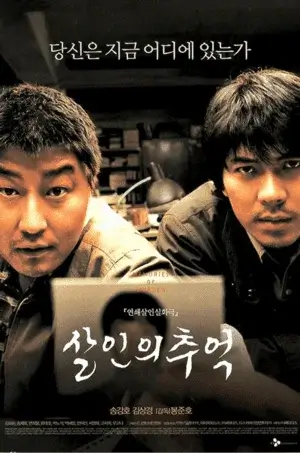In 1986, in the provincial town of Hwaseong, two local women are murdered in the same twisted way. Detective Park Too-man and his assistant Jo Young-gu are trying with all their might to find the killer. More precisely – to make any suspect confess to the crime, and they do it with the most brutal methods. Detective Seo Tae-young from Seoul arrives to investigate and find the maniac based on the evidence. Meanwhile, the murders continue.
4k movies reviews
“Memories of Murder” is one of the best directorial works of the cult South Korean master Joon-ho Bong, a renowned denouncer of political institutions and social vices, almost every creation of which is a resounding slap in the face of modern society and the state. Memories…” is based on real events that took place in South Korea in the period from 1986 to 1991, when a sexual maniac, later nicknamed “Hwasong serial killer”, terrorized a small town with impunity, raping and killing its young residents. At the same time, the picture should not be evaluated as a kind of reconstruction of the materials of the criminal case. The creators of the movie do not get involved in the web of documentary and schematic and do not claim to be authentic. To a greater extent they saturate the plot space with sharp blades of social subtexts, turning the detective story into a bitter author’s rethinking of the devastating consequences of the social and state upheavals, which for many decades seemed to cover the whole country with fire.
The whirlwind of internal political chaos accompanies the detectives on their way to establishing the truth with a thunderous background of mass strikes, student demonstrations and daily civil defense drills, progressively increasing the heavy and viscous atmosphere of hidden anxiety during the film. From time to time the degree of narrative tension is lowered by the director with the help of appropriately created humorous episodes, which slow down the pace of the linear development of the script, emphasizing its multi-genre nature. But comedy with an emphasis on the behavior of some characters is used by the director only as an artistic device with the aim of maximally reliable modeling of cinematic images, no more. Because literally in the next frame there is no trace of the former fun, and in the cascade of desperate attempts of the police to prevent another murder, the personal tragedy of the people who are investigating the case begins to reflect quite clearly. Joon-ho Bong skillfully reveals the personalities of the characters, showing how the chain of terrible crimes becomes more intertwined with their lives every day, driving the detectives to a frenzy of agonizing realization of their own helplessness in the face of a cunning adversary.
With the non-linear development of the story, Joon-ho Bong deliberately shades the detective intrigue, successfully developing the genre of dramatic thriller with a pronounced social bias, within the boundaries of which the director extremely acutely voices the imperfection of the police machine, proving the ineffectiveness of its mechanisms in critical situations. Trying to get on the trail of a maniac, the guards of the law build ridiculously absurd versions, torture suspects, beating false confessions out of them. And in the police station start squabbles and scuffles with each other, completely forgetting about the main purpose of their investigation. Day after day the detectives predictably remain one step behind the elusive criminal, earning themselves an offensive image of hapless contemplators in the eyes of others. Using vivid plot examples, the director demonstrates to the viewer the catastrophically high level of legal nihilism in the South Korean countryside, the lack of initiative and professional unpreparedness of the provincial police and, as a consequence, the terrible disorganization of the entire law enforcement system, whose mistakes are destined to be paid for by innocent victims.
The South Koreans have created not just an intelligent and in many ways symbolic cinematic work, they have presented to the audience a painful cross-section of the national mentality, which from the perspective of the Russian audience can be perceived as particularly relevant due to the mirror similarity of most of the problems identified by the director. And the heart-wrenching finale of Memories of Murder, with its depth of meaningfulness, turns out to be so powerful in terms of the strength of its emotional charge and so close to understanding that it absolutely leaves the minor dramaturgical and performance errors of the film as a whole out of the field of criticism.
Info Blu-ray
Video
Codec: HEVC / H.265 (79.9 Mb/s)
Resolution: 4K (2160p)
Aspect ratio: 1.85:1
Original aspect ratio: 1.85:1
Audio
Korean: DTS-HD Master Audio 5.1
Korean: DTS 2.0
Korean: Dolby Digital 2.0
English: Dolby Digital 2.0
Subtitles
English, French.

